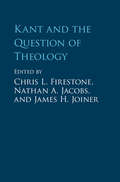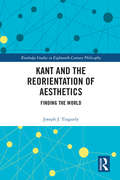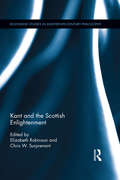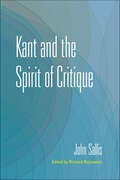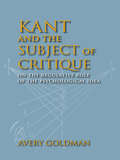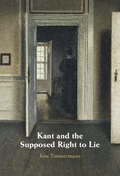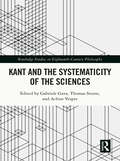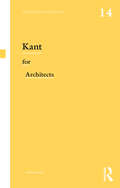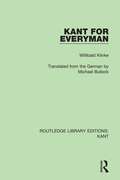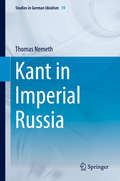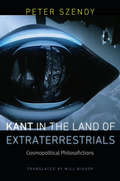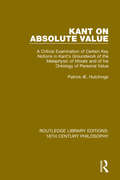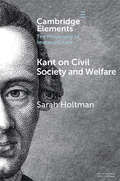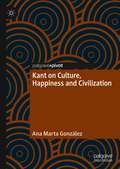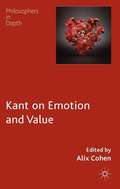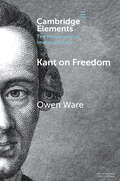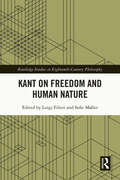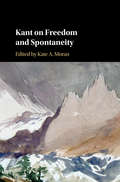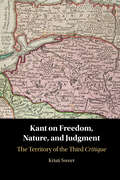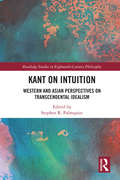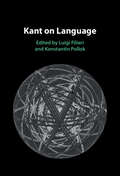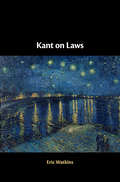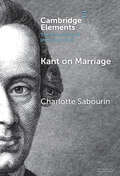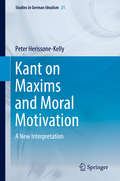- Table View
- List View
Kant and the Question of Theology
by James H. Jacobs Joiner Nathan A. Firestone Chris L.God is a problematic idea in Kant's terms, but many scholars continue to be interested in Kantian theories of religion and the issues that they raise. In these new essays, scholars both within and outside Kant studies analyse Kant's writings and his claims about natural, philosophical, and revealed theology. Topics debated include arguments for the existence of God, natural theology, redemption, divine action, miracles, revelation, and life after death. The volume includes careful examination of key Kantian texts alongside discussion of their themes from both constructive and analytic perspectives. These contributions broaden the scope of the scholarship on Kant, exploring the value of doing theology in consonance or conversation with Kant. It builds bridges across divides that often separate the analytic from the continental and the philosophical from the theological. The resulting volume clarifies the significance and relevance of Kant's theology for current debates about the philosophy of God and religion.
Kant and the Reorientation of Aesthetics (Routledge Studies in Eighteenth-Century Philosophy)
by Joseph J. TinguelyThis book argues that the philosophical significance of Kant’s aesthetics lies not in its explicit account of beauty but in its implicit account of intentionality. Kant’s account is distinct in that feeling, affect, or mood must be operative within the way the mind receives the world. Moreover, these modes of receptivity fall within the normative domain so that we can hold each other responsible for how we are "struck" by an object or scene. Joseph Tinguely composes a series of investigations into the philosophically rich but regrettably neglected topics at the intersection of Kant’s aesthetics and epistemology, such as how we orient ourselves in the world, whether tonality is a property of the subject or object, and what we hope to accomplish when we quarrel about taste. Taken together, these investigations offer a robust and defensible picture of mind, which not only resolves tensions in a Kantian account of intentionality but also offers a timely intervention into contemporary debates about the "aesthetic" nature of the way the mind is in touch with the world. Kant and the Reorientation of Aesthetics will appeal to scholars and students of Kant, as well as those working at the intersection of aesthetics and philosophy of mind.
Kant and the Scottish Enlightenment (Routledge Studies in Eighteenth-Century Philosophy)
by Elizabeth Robinson Chris W. SurprenantMost academic philosophers and intellectual historians are familiar with the major historical figures and intellectual movements coming out of Scotland in the 18th Century. These scholars are also familiar with the works of Immanuel Kant and his influence on Western thought. But with the exception of discussion examining David Hume’s influence on Kant’s epistemology, metaphysics, and moral theory, little attention has been paid to the influence of the Scottish Enlightenment thinkers on Kant’s philosophy. This volume aims to fill this perceived gap in the literature and provide a starting point for future discussions looking at the influence of Hume, Thomas Reid, Adam Smith, and other Scottish Enlightenment thinkers on Kant’s philosophy.
Kant and the Spirit of Critique (The Collected Writings of John Sallis)
by John SallisThis volume of the Collected Writings of John Sallis presents his lecture courses on Kant. Each course was devoted respectively to one of Kant's three Critiques, and so the book as a whole treats the entirety of the Kantian critical project. Sallis displays here, as he does in all his lecture courses, an uncanny ability to open up dense philosophical texts. The matters Kant deals with—in theoretical, practical, and aesthetic philosophy—are difficult in themselves, and Kant's writings might at times seem so convoluted as to magnify the difficulty. Sallis patiently and successfully lays out the issues and the critical approach to them, such that the reader is led step by step into the very core of Kant's spirit of critique. This volume makes Kant accessible to students, while the most advanced scholars will also profit from it.
Kant and the Subject of Critique
by Avery GoldmanImmanuel Kant is strict about the limits of self-knowledge: our inner sense gives us only appearances, never the reality, of ourselves. Kant may seem to begin his inquiries with an uncritical conception of cognitive limits, but in Kant and the Subject of Critique, Avery Goldman argues that, even for Kant, a reflective act must take place before any judgment occurs. Building on Kant's metaphysics, which uses the soul, the world, and God as regulative principles, Goldman demonstrates how Kant can open doors to reflection, analysis, language, sensibility, and understanding. By establishing a regulative self, Goldman offers a way to bring unity to the subject through Kant's seemingly circular reasoning, allowing for critique and, ultimately, knowledge.
Kant and the Supposed Right to Lie
by Jens TimmermannIn his 1797 essay 'On a Supposed Right to Lie from Love of Humanity', Kant argues that when only a confident lie might save a friend, one must, if asked, reply truthfully and thus betray his hiding-place to the person who wants to kill him. This is the first monograph to explore Kant's essay in detail. Jens Timmermann examines the background of the piece (Kant was provoked by Benjamin Constant and his translator, Carl Friedrich Cramer); the history of the example (which was also discussed by, amongst others, Augustine, Fichte and Johann David Michaelis); the peculiarities of Constant's version of the case; and Kant's core argument against Constant: lying, or a right to lie, would undermine contractual rights and spell disaster for all humanity. This rich, interpretative resource, which includes a facing-page translation of Kant's essay, will be of wide interest to Kant scholars and moral philosophers.
Kant and the Systematicity of the Sciences (Routledge Studies in Eighteenth-Century Philosophy)
by Thomas Sturm Gabriele Gava Achim VesperThis book provides the first comprehensive discussion regarding the role that Kant ascribes to systematicity in the sciences. It considers not only what Kant has to say on systematicity in general, but also how the systematicity requirement for science is specified in different fields of knowledge.The chapters are divided into three thematic sections. Part I is devoted to historical context. The chapters explore precursors of Kant’s account of the systematicity of the sciences. Part II addresses the application of systematicity to the special sciences – cosmology, physics, chemistry, logic, mathematics, the life sciences, and history. Finally, Part III explores the systematicity of philosophy.Kant and the Systematicity of the Sciences will be of interest to scholars and advanced students working on Kant and the history and philosophy of science.
Kant for Architects (Thinkers for Architects)
by Diane MorganThis book introduces architects to a philosopher, Immanuel Kant, whose work was constantly informed by a concern for the world as an evolving whole. According to Kant, in this interconnected and dynamic world, humans should act as mutually dependent and responsible subjects. Given his future-oriented and ethico-politically concerned thinking, Kant is a thinker who clearly speaks to architects. This introduction demonstrates how his ideas bear pertinently and creatively upon the world in which we live now and for which we should care thoughtfully. Kant grounded his enlightened vision of philosophy’s mission using an architectural metaphor: of the modest 'dwelling-house'. Far from constructing speculative 'castles in the sky' or vertiginous 'towers which reach to the heavens', he tells us that his humble aim is rather to build a 'secure home for ourselves', one which appropriately corresponds at once to the limited material resources available on our planet, and to our need for firm and solid principles to live by. This book also explores Kant's notions of cosmopolitics, which attempts to think politics from a global perspective by taking into account the geographical fact that the earth is a sphere with limited land mass and natural resources. Given the urgent topicality of sustainable development, these Kantian texts are of particular interest for architects of today. Students of architecture, who are necessarily trained in negotiating between theory and practice, gain much from considering Kant, whose critical project also consisted of testing and exploring the viability of ideas, so as to ascertain to what extent, and crucially, how ideas can have a constructive effect on the whole world, and on us as active agents therein.
Kant for Everyman (Routledge Library Editions: Kant #6)
by Willibald KlinkeFirst published in 1951. This title aims to familiarise the reader with the ideas of the sometimes difficult philosopher Immanuel Kant by presenting them in a more comprehensible form. Kant for Everyman provides an overview of the different stages in Kant’s life, and delivers a breakdown of his philosophical ideology. This title will be of interest to students of philosophy.
Kant in Imperial Russia
by Thomas NemethThis book presents a comprehensive study of the influence of Immanuel Kant's Critical Philosophy in the Russian Empire, spanning the period from the late 19th century to the Bolshevik Revolution. It systematically details the reception bestowed on Kant's ideas during his lifetime and up to and through the era of the First World War. The book traces the tensions arising in the early 19th century between the imported German scholars, who were often bristling with the latest philosophical developments in their homeland, and the more conservative Russian professors and administrators. The book goes on to examine the frequently neglected criticism of Kant in the theological institutions throughout the Russian Empire as well as the last remaining, though virtually unknown, embers of Kantianism during the reign of Nicholas I. With the political activities of many young radicals during the subsequent decades having been amply studied, this book focuses on their largely ignored attempts to grapple with Kant's transcendental idealism. It also presents a complete account of the resurgence of interest in Kant in the last two decades of that century, and the growing attempts to graft a transcendental idealism onto popular social and political movements. The book draws attention to the young and budding Russian neo-Kantian movement that mirrored developments in Germany before being overtaken by political events.
Kant in the Land of Extraterrestrials: Cosmopolitical Philosofictions
by Peter Szendy“Yes, Kant did indeed speak of extraterrestrials.” This phrase could provide the opening for this brief treatise of philosofiction (as one speaks of science fiction). What is revealed in the aliens of which Kant speaks—and he no doubt took them more seriously than anyone else in the history of philosophy—are the limits of globalization, or what Kant called cosmopolitanism.Before engaging Kantian considerations of the inhabitants of other worlds, before comprehending his reasoned alienology, this book works its way through an analysis of the star wars raging above our heads in the guise of international treaties regulating the law of space, including the cosmopirates that Carl Schmitt sometimes mentions in his late writings.Turning to track the comings and goings of extraterrestrials in Kant’s work, Szendy reveals that they are the necessary condition for an unattainable definition of humanity. Impossible to represent, escaping any possible experience, they are nonetheless inscribed both at the heart of the sensible and as an Archimedean point from whose perspective the interweavings of the sensible can be viewed.Reading Kant in dialogue with science fiction films (films he seems already to have seen) involves making him speak of questions now pressing in upon us: our endangered planet, ecology, a war of the worlds. But it also means attempting to think, with or beyond Kant, what a point of view might be.
Kant on Absolute Value: A Critical Examination of Certain Key Notions in Kant's 'Groundwork of the Metaphysic of Morals' and of his Ontology of Personal Value (Routledge Library Editions: 18th Century Philosophy #9)
by Patrick Æ. HutchingsThe thesis of this book, first published in 1972, is that Kant’s notions of ‘absolute worth’, the ‘unconditioned’ and ‘unconditioned worth’ are rationalistic and confused, and that they spoil his ontology of personal value and tend to subvert his splendid idea of the person as an End in himself.
Kant on Civil Society and Welfare (Elements in the Philosophy of Immanuel Kant)
by Sarah HoltmanWhat justifies state-sponsored supports for individual welfare within a Kantian political system, as well as the purpose and extent of such supports and the form they may take, are vexed questions. This Element characterizes and assesses main contenders (including minimalist and middle-ground accounts) by examining the competing interpretations of Kant's larger political theory that found their social welfare claims. It then develops and defends an alternative based in civic respect. This emphasizes the perspective and institutional commitments Kant's model of citizenship entails and what is required to respect each as both a person and a participant in joint governance.
Kant on Culture, Happiness and Civilization
by Ana Marta GonzálezThis book joins the contemporary recovery of Kant’s empirical works to highlight the relevance of his concept of culture for understanding the sources of various characteristic modern dilemmas, such as the tension between culture and happiness, the morally ambivalent nature of cultural progress, or the existing conflicts between a factual plurality of cultures and the historical forces pressing toward a universal civilization. The book will be of special interest for Kantian scholars, moral and political philosophers, as well as philosophers of culture.
Kant on Emotion and Value
by Alix CohenBy combining new cutting-edge essays and reprints by leading Kant scholars and Kantian philosophers, this volume offer the first comprehensive assessment of Kant's account of the emotions and their connection to value, whether in his philosophy of mind, ethics, aesthetics, religion and politics. Through a mixture of interpretation and critical discussion, the essays in this volume illuminate the various aspects of Kant's distinctive approach to the emotions and demonstrate its continuing relevance to philosophical debates. This collection will enrich current debates within Kantian scholarship as well as beyond, and will be of great interest to upper-level students and scholars of Kant, value theory, philosophy of emotion and aesthetics.
Kant on Freedom (Elements in the Philosophy of Immanuel Kant)
by Owen WareKant's early critics maintained that his theory of freedom faces a dilemma: either it reduces the will's activity to strict necessity by making it subject to the causality of the moral law, or it reduces the will's activity to blind chance by liberating it from rules of any kind. This Element offers a new interpretation of Kant's theory against the backdrop of this controversy. It argues that Kant was a consistent proponent of the claim that the moral law is the causal law of a free will, and that the supposed ability of free will to choose indifferently between options is an empty concept. Freedom, for Kant, is a power to initiate action from oneself, and the only way to exercise this power is through the law of one's own will, the moral law. Immoral action is not thereby rendered impossible, but it also does not express a genuine ability.
Kant on Freedom and Human Nature (Routledge Studies in Eighteenth-Century Philosophy)
by Sofie Møller Luigi FilieriThe essays in this volume provide new readings of Kant’s account of human nature. Despite the relevance of human nature to Kant’s philosophy, little attention has been paid to the fact that the question about human nature originally pertains to pure reason. The chapters in this volume show that Kant’s point is not to state once and for all what the human being actually is, but to unite pure reason’s efforts within a unitary teleological perspective. The question about human nature is the cornerstone of reason’s unity in its different activities and domains. Kant’s question about human nature goes beyond our empirical inquiries to show that the notion of humanity represents the point of convergence and unity of pure reason’s most fundamental interests. Kant on Freedom and Human Nature will appeal to scholars and advanced students working on Kant’s philosophy.
Kant on Freedom and Human Nature (Routledge Studies in Eighteenth-Century Philosophy)
by Sofie Møller Luigi FilieriThe essays in this volume provide new readings of Kant’s account of human nature.Despite the relevance of human nature to Kant’s philosophy, little attention has been paid to the fact that the question about human nature originally pertains to pure reason. The chapters in this volume show that Kant’s point is not to state once and for all what the human being actually is, but to unite pure reason’s efforts within a unitary teleological perspective. The question about human nature is the cornerstone of reason’s unity in its different activities and domains. Kant’s question about human nature goes beyond our empirical inquiries to show that the notion of humanity represents the point of convergence and unity of pure reason’s most fundamental interests.Kant on Freedom and Human Nature will appeal to scholars and advanced students working on Kant’s philosophy.
Kant on Freedom and Spontaneity
by Kate A. MoranSpontaneity - understood as an action of the mind or will that is not determined by a prior external stimulus - is a theme that resonates throughout Immanuel Kant's theoretical and practical philosophy. Though spontaneity and the concomitant notion of freedom lie at the foundation of many of Kant's most pivotal theses and arguments regarding cognition, judgment, and moral action, spontaneity and freedom themselves often remain cloaked in mystery, or accessible only via transcendental argument. This volume brings together a distinguished group of scholars who explore the nature of freedom and spontaneity, the arguments Kant offers surrounding these concepts, and their place in Kant's larger philosophical system. The collection will be of interest to scholars interested in any aspect of Kant's philosophy, especially those who hope to gain a deeper insight into these fundamental Kantian ideas.
Kant on Freedom, Nature, and Judgment: The Territory of the Third Critique
by Kristi SweetKant's Critique of Judgment seems not to be an obviously unified work. Unlike other attempts to comprehend it as a unity, which treat it as serving either practical or theoretical interests, Kristi Sweet's book posits it as examining a genuinely independent sphere of human life. In her in-depth account of Kant's Critical philosophical system, Sweet argues that the Critique addresses the question: for what may I hope? The answer is given in Kant's account of 'territory,' a region of experience that both underlies and mediates between freedom and nature. Territory forms the context in which purposiveness without a purpose, the Ideal of Beauty, the sensus communis, genius and aesthetic ideas, and Kant's conception of life and proof of God are best interpreted. Encounters in this sphere are shown to refer us to a larger, more cosmic sense of a whole to which both freedom and nature belong.
Kant on Intuition: Western and Asian Perspectives on Transcendental Idealism (Routledge Studies in Eighteenth-Century Philosophy)
by Stephen R. PalmquistKant on Intuition: Western and Asian Perspectives on Transcendental Idealism consists of 20 chapters, many of which feature engagements between Kant and various Asian philosophers. Key themes include the nature of human intuition (not only as theoretical—pure, sensible, and possibly intellectual—but also as relevant to Kant’s practical philosophy, aesthetics, the sublime, and even mysticism), the status of Kant’s idealism/realism, and Kant’s notion of an object. Roughly half of the chapters take a stance on the recent conceptualism/non-conceptualism debate. The chapters are organized into four parts, each with five chapters. Part I explores themes relating primarily to the early sections of Kant’s first Critique: three chapters focus mainly on Kant’s theory of the "forms of intuition" and/or "formal intuition", especially as illustrated by geometry, while two examine the broader role of intuition in transcendental idealism. Part II continues to examine themes from the Aesthetic but shifts the main focus to the Transcendental Analytic, where the key question challenging interpreters is to determine whether intuition (via sensibility) is ever capable of operating independently from conception (via understanding); each contributor offers a defense of either the conceptualist or the non-conceptualist readings of Kant’s text. Part III includes three chapters that explore the relevance of intuition to Kant’s theory of the sublime, followed by two that examine challenges that Asian philosophers have raised against Kant’s theory of intuition, particularly as it relates to our experience of the supersensible. Finally, Part IV concludes the book with five chapters that explore a range of resonances between Kant and various Asian philosophers and philosophical ideas.
Kant on Language
by Konstantin Pollok Luigi FilieriKant had thoughts on language, but his account of language is not explicit and cannot be found in any dedicated section of his works, so it needs to be philosophically reconstructed. The chapters in this volume investigate Kant's views on language from unique perspectives. They demonstrate that Kant's notions of thinking, knowing, communicating, and acting have implications for the philosophy of language: from the problem of empirical concept-formation to the categorial structure of experience, from the exhibition of aesthetic ideas to the role of analogies and metaphors, from poetry as the art of language to the moral relevance of rhetoric and the problem of persuasion, and from the source of Kant's philosophical vocabulary to the role of language in defining 'humanity'. The volume offers a new and distinctive interpretive context in which Kant's approach to language can be critically appreciated.
Kant on Laws
by Eric WatkinsThis book focuses on the unity, diversity, and centrality of the notion of law as it is employed in Kant's theoretical and practical philosophy. Eric Watkins argues that, by thinking through a number of issues in various historical, scientific, and philosophical contexts over several decades, Kant is able to develop a univocal concept of law that can nonetheless be applied to a wide range of particular cases, despite the diverse demands that these contexts give rise to. In addition, Watkins shows how Kant comes to view both the generic conception of law which he develops and its different particular instances as crucial components of his systematic philosophy as a whole. This volume's new and unified account of a major current running through Kant's work will be important for scholars interested in numerous aspects of his philosophy, from the theoretical and abstract to the practical and empirical.
Kant on Marriage (Elements in the Philosophy of Immanuel Kant)
by Charlotte SabourinThis Element proposes a new understanding of Kant's account of marriage by examining the context and background conversations that shaped its development and by discussing the conception of equality at its core. Marriage as Kant understands it relies on a certain form of equality between spouses. Yet this conception of equality does not precede marriage, and carries important limitations – one of which being its inaccessibility to a significant proportion of the German population at the time. The protections and rights conferred by marriage were thus not accessible to all. Their shared preoccupation with this issue allows the author to put Kant's thoughts in relation with those of eighteenth-century feminist writers Theodor von Hippel and Marianne Ehrmann. Despite these limitations, the author finds that Kant's conception of marriage is compatible with the achievement of certain egalitarian goals, suggesting that it may be able to improve women's lives in a liberal state.
Kant on Maxims and Moral Motivation: A New Interpretation (Studies in German Idealism #21)
by Peter Herissone-KellyThis book outlines and circumvents two serious problems that appear to attach to Kant’s moral philosophy, or more precisely to the model of rational agency that underlies that moral philosophy: the problem of experiential incongruence and the problem of misdirected moral attention. The book’s central contention is that both these problems can be sidestepped. In order to demonstrate this, it argues for an entirely novel reading of Kant’s views on action and moral motivation. In addressing the two main problems in Kant’s moral philosophy, the book explains how the first problem arises because the central elements of Kant’s theory of action seem not to square with our lived experience of agency, and moral agency in particular. For example, the idea that moral deliberation invariably takes the form of testing personal policies against the Categorical Imperative seems at odds with the phenomenology of such reasoning, as does the claim that all our actions proceed from explicitly adopted general policies, or maxims. It then goes on to discuss the second problem showing how it is a result of Kant’s apparent claim that when an agent acts from duty, her reason for doing so is that her maxim is lawlike. This seems to put the moral agent’s attention in the wrong place: on the nature of her own maxims, rather than on the world of other people and morally salient situations. The book shows how its proposed novel reading of Kant’s views ultimately paints an unfamiliar but appealing picture of the Kantian good-willed agent as much more embedded in and engaged with the world than has traditionally been supposed.
